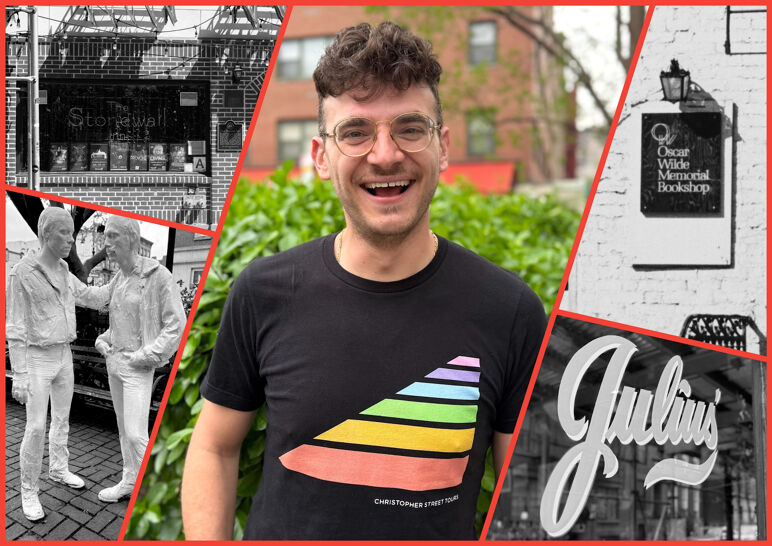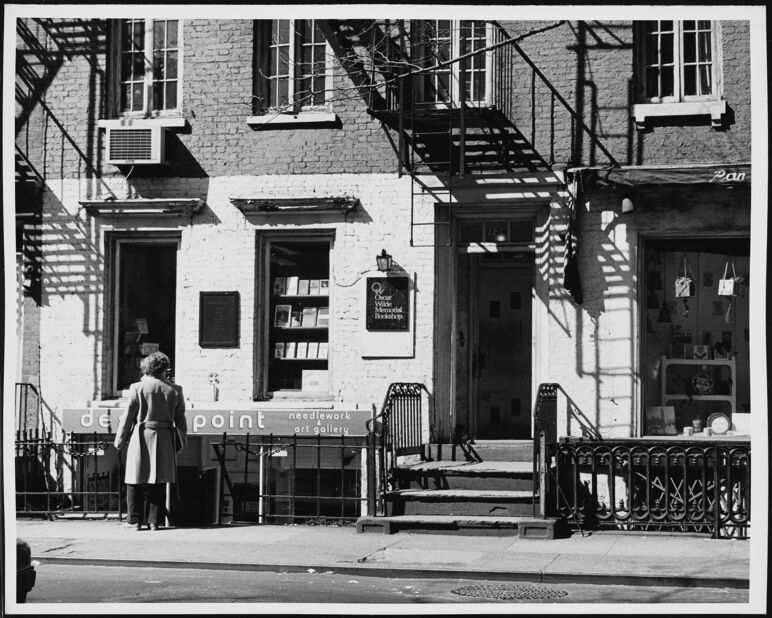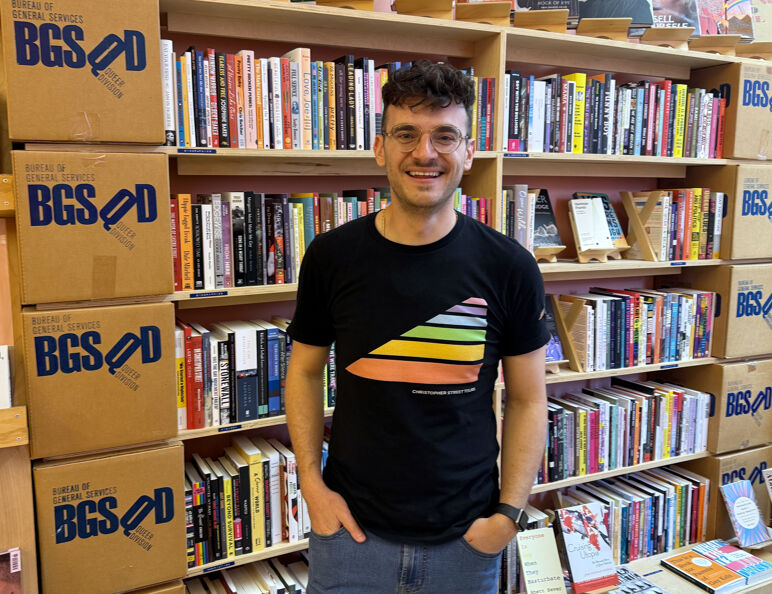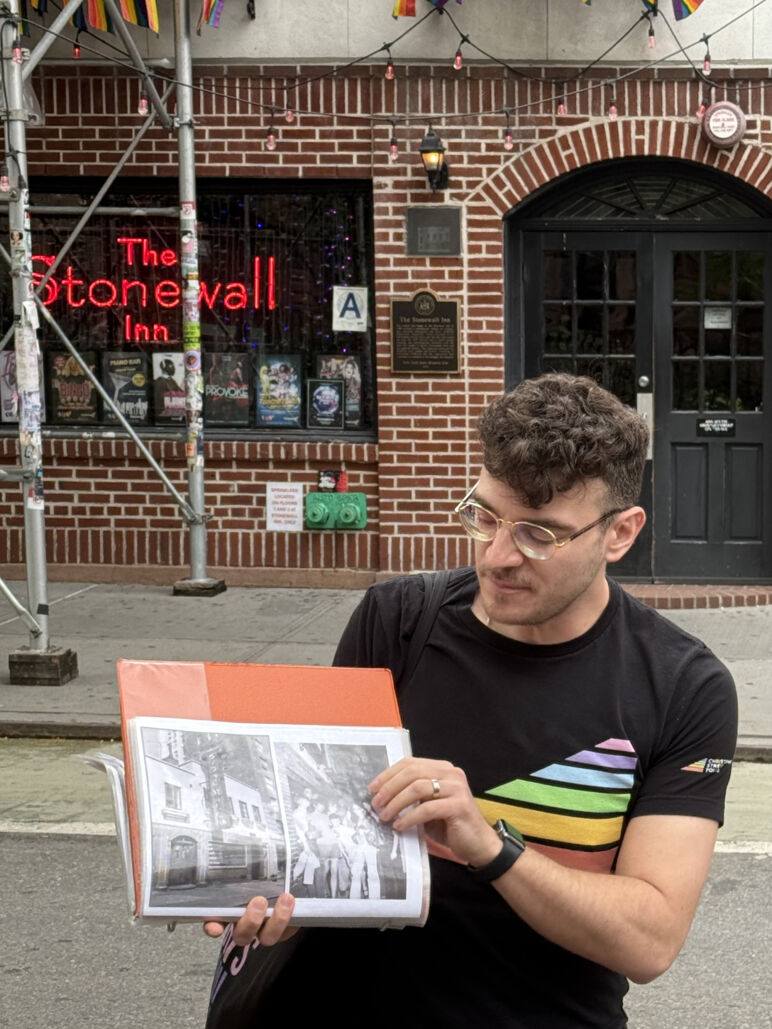

Will you be one of the more than two million people attending New York City Pride this year? If crowds aren’t your thing, there are still plenty of ways to celebrate LGBTQ+ history and the queer trailblazers who came before us. Queerty recently took a stroll with Christopher Street Tours, an LGBTQ+-owned and operated walking tour that offers an insider’s perspective on some of the West Village’s most iconic queer landmarks, along with a few lesser-known discoveries to impress your friends at your next gay dinner party.
Michael Venturiello founded Christopher Street Tours in 2018, telling Queerty he wanted to “share stories that uplift voices of those that came before us.” The Stonewall Inn is central to that narrative, but who doesn’t love a subplot?
As we strolled along Gay Street (yes, it exists) and other nearby queer enclaves, Venturiello shared his deep knowledge of LGBTQ+ history in a fresh, contempoary way that felt unique from other walking tours.
How about we take this to the next level?
Subscribe to our newsletter for a refreshing cocktail (or mocktail) of LGBTQ+ entertainment and pop culture, served up with a side of eye-candy.
Given the recent political pushback against LGBTQ+ visibility, tours like Venturiello’s are essential for preserving our queer legacy. Even though we’re in the business of gay news, we learned a few things along the way, too.
The famous ‘Sip-In’ at Julius’ was a planned photo-op
Before the Stonewall Riots, a trio of activists from The Mattachine Society planned a different kind of protest—one that was calculated for maximum media coverage. New York chapter leader Dick Leitsch and members Craig Rodwell (remember that name) and Randy Wicker) planned a protest that took a nod from the Civil Rights movement sit-ins. These were non-violent, civil disobedience protests aimed at drawing attention without escalating the situation.
The plan was to pronounce their gay identity, order a drink, and snap a photo when denied, thereby highlighting discriminatory business practices. For better or worse, the men were served at Howard Johnson’s and Waiki, but achieved their goal at Julius’, which had been raided several days earlier.
Venturiello refers to this event and similar happenings as “a lot of mini spikes” before the events at Stonewall, efforts that “legitimized the birth of gay bar culture.”
A letterpress shop with a storied past


Unlike the behemoth of Times Square, where you can fall down a chocolate rabbit hole at M&M’s World, the Village still retains its bespoke quality with independent retailers. Many have come and gone over the years, including the Oscar Wilde Memorial Bookshop. First opened in 1967, Rodwell (of Julius’ sip-in fame) eventually moved the store and community gathering spot to 15 Christopher Street, now home to Greenwich Letterpress.
“One word can be a form of protest,” says Venturiello, about the use of the word “homophile” vs “homosexual” during pre-Stonewall activism as a way to dissociate from overtly sexualizing the LGBTQ+ community. But regardless of which faction customers aligned themselves with, the bookstore became an essential touchpoint for community organizing.
Rodwell’s impact spanned beyond New York City’s borders. He proved a valuable ally to Giovanni’s Room, an upstart queer bookstore in Philadelphia. Rodwell accompanied co-founders Tom Wilson Weinberg, Dan Sherbo, and Bern Boyle to wholesale booksellers in Brooklyn, where they bought “anything we considered queer-worthy,” according to Weinberg—cash only.
Before there was your local LGBTQ+ center, there was Liberation House


We never understood why Carrie Bradshaw’s fictional address was on the Upper East Side, while the real stoop resides on Perry Street. (Maybe we’ll find out on this season of And Just Like That.) In either case, decades before our favorite fictional foursome was sipping Cosmos, real-life friends Leonard Ebreo and Alice Bloch co-founded Liberation House in the basement of 247 West 11th Street (where you can now rent a one-bedroom apartment for $3,600/month!).
A folding table and a handful of chairs were all the pair needed to jumpstart dozens of local organizations. One of them was the Gay Men’s Health Project, a volunteer-based clinic that merged in 1983 with St. Mark’s Clinic and eventually became Callen-Lorde, now a network of LGBTQ+-inclusive health centers.
While we may feel enraged given recent acts by the current administration to diminish access to LGBTQ+ services, particularly trans health care, history shows that our resilience cannot be silenced.
“By the time of Stonewall, we had fifty to sixty gay groups in the country,” said activist Frank Kameny in 1994. “A year later, there were at least fifteen hundred. By two years later, to the extent that a count could be made, it was twenty-five hundred. And that was the impact of Stonewall.”
The Stonewall Inn’s secret: Follow the money


Any New York City LGBTQ+ history tour should include The Stonewall Inn, no surprises there. However, Venturiello unpacks the complex relationship between its owners (the Genovese crime family), the police, and patrons.
According to David Carter’s historical account, Stonewall, the bar was a cash cow from the time family member Tony Lauria transformed it into a queer establishment. Chuck Shaheen, who helped run the bar, reported grossing up to $6,000 per night.
“With the initial investment being $3,500 and the monthly rent only $300 a month, the Stonewall Inn made back all of its investment and then some the first night,” wrote Carter, “so that after a few hours of operation it was essentially pure profit every day for nearly two and a half years.”
Lauria bribed New York City’s Sixth Police Precinct for about $1,200 a month, which still left plenty for the crime ring and its cronies. Still, the bar was at the ready for regular raids, and that just scratches the surface of what was going on inside.
According to PBS, “Fat Tony” skimped on the plumbing. Forget running water—bartenders reused glasses, and the venue lacked a rear exit, violating safety regulations.
But the queers survived, and The Stonewall Inn survives. And now, LGBTQ+ people of all ages can explore the adjacent Stonewall National Monument Visitor Center, led by two queer women of color, Pride Live co-founders Diana Rodriquez and Ann Marie Gothard.
Christopher Street Tours hosts regularly scheduled group tours and is available for private and youth tours.
Related*


Sign up for the Queerty newsletter to stay on top of the hottest stories in LGBTQ+ entertainment, politics, and culture.








